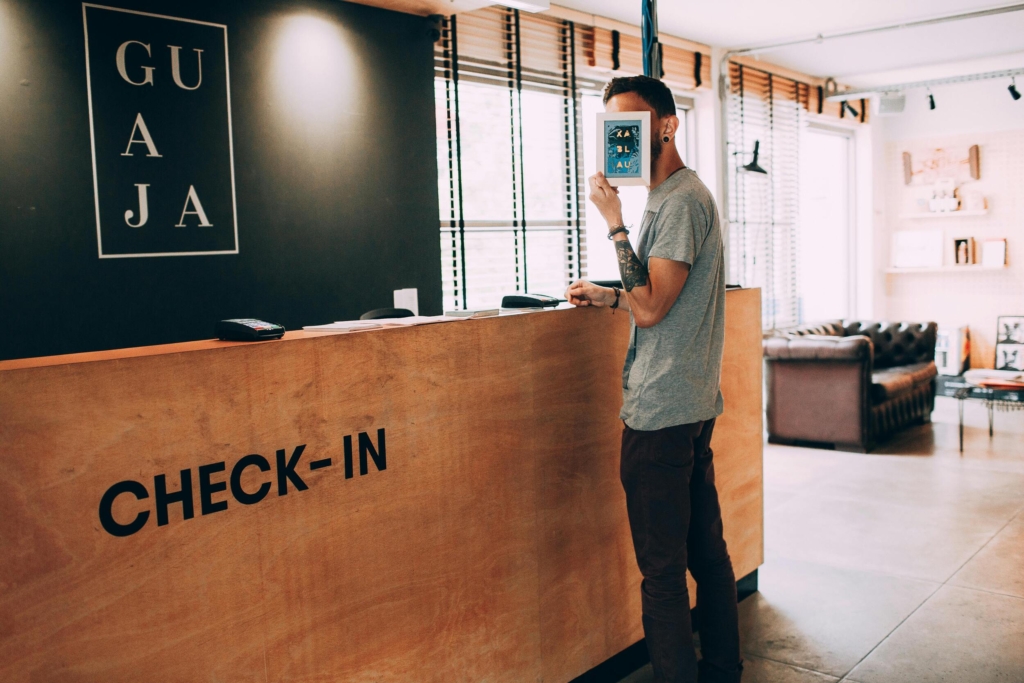Boutique hotels are synonymous with unique experiences, personalized service, and intimate settings. However, in a crowded hospitality market, standing out requires more than just a beautiful property. A well-crafted boutique hotel marketing strategy is essential to attract the right guests, increase bookings, and build lasting loyalty.
In this comprehensive guide, we’ll explore actionable strategies to help boutique hoteliers thrive in 2025 and beyond. From defining your unique selling proposition (USP) to leveraging digital marketing, local partnerships, and expert insights from NUOPTIMA, these tips will set your property apart.

What is a Boutique Hotel?
A boutique hotel is a small, stylish property (typically 10 – 100 rooms) known for its unique design, personalized service, and connection to local culture. Unlike large chain hotels, boutique properties focus on creating memorable, one-of-a-kind experiences, such as curated decor, locally inspired dining, or intimate wellness retreats. Their smaller scale allows for tailored guest interactions, making them ideal for travelers seeking authenticity and exclusivity.
How Do Boutique Hotels Differ from Traditional Hotels?
Boutique hotels stand out through their intimate atmosphere, unique themes, and personalized service, appealing to niche audiences like luxury seekers and couples. Traditional hotels, on the other hand, prioritize convenience and consistency, catering to a broader demographic with standardized amenities and larger capacities. Boutique properties often emphasize local culture and aesthetic appeal, while traditional hotels focus on reliability and scalability, often located near airports or major tourist hubs.

Crafting a Winning Marketing Strategy for Boutique Hotels
A strong marketing strategy is essential for boutique hotels to stand out in a competitive market. While large chain hotels rely on brand recognition and scale, boutique properties thrive on their ability to offer unique, personalized experiences. This is both their greatest strength and their biggest challenge.
With smaller budgets and fewer resources, boutique hotels must be strategic in how they allocate their efforts. A well-crafted marketing strategy not only highlights what makes your property special but also ensures you reach the right audience in the most effective way.
In the following sections, we’ll explore the key elements of a successful boutique hotel marketing strategy, from defining your unique selling proposition to leveraging digital tools and building lasting guest relationships. Let’s dive in.
Define Your Unique Selling Proposition (USP)
Your USP is what sets your boutique hotel apart from competitors. It’s the reason guests choose your property over others. To define your USP:
- Identify Key Differentiators: What makes your hotel unique? Is it your location, design, personalized service, or connection to local culture?
- Highlight Guest Experiences: Showcase the experiences only your hotel can offer, such as a rooftop bar with panoramic views or a spa with locally inspired treatments.
- Communicate Consistently: Ensure your USP is reflected across all marketing channels, including your website, social media, and email campaigns.
For example, if your hotel is located in a historic building, emphasize its rich history and architectural beauty. If you offer farm-to-table dining, highlight your commitment to local, sustainable cuisine.
Understand Your Target Audience
Knowing your audience is crucial for effective marketing. Boutique hotels often attract specific types of travelers, such as couples, families, or luxury seekers. To identify your target audience:
- Analyze Guest Data: Review past bookings to understand demographics, preferences, and behaviors.
-
Segment Your Audience: Tailor your marketing messages to different groups. For example:
- Young Professionals: Emphasize modern amenities, tech-friendly rooms, and proximity to nightlife.
- Families: Highlight family-friendly services, spacious accommodations, and nearby attractions.
- Luxury Travelers: Focus on premium services, exclusive experiences, and privacy.
By understanding your audience, you can create personalized campaigns that resonate with their needs and preferences.
Build a Strong Online Presence
In today’s digital age, your online presence is often the first impression potential guests have of your hotel. To make it count:
- Optimize Your Website: Ensure your site is mobile-friendly, easy to navigate, and features a seamless booking process.
- Invest in Visual Content: Use high-quality photos and videos to showcase your property’s unique features. Virtual tours are especially effective for giving guests a feel for your hotel.
- Leverage SEO: Optimize your website with relevant keywords, such as “boutique hotel in [city]” or “luxury stay near [landmark].” This helps your property rank higher in search engine results.
A strong online presence not only attracts guests but also builds trust and credibility.
Harness the Power of Social Media
Social media is a powerful tool for boutique hotels to connect with potential guests and showcase their personality. Platforms like Instagram and Pinterest are ideal for visual storytelling.
- Share Engaging Content: Post a mix of professional photos, behind-the-scenes glimpses, and user-generated content. Highlight unique features like your decor, dining options, or local attractions.
- Run Targeted Ads: Use social media advertising to reach specific demographics, such as local travelers or international tourists. Retargeting ads can help convert users who have previously visited your website.
- Engage With Followers: Respond to comments, share guest posts, and run contests to build a loyal community.
Social media allows you to showcase your hotel’s personality and create a sense of connection with potential guests.
Create Compelling Content Marketing
Content marketing helps establish your hotel as a thought leader and trusted resource. By providing valuable content, you can attract and engage your target audience.
- Start a Blog: Write articles about local attractions, travel tips, and hotel news. For example, “Top 5 Hidden Gems in [City]” or “A Foodie’s Guide to [Neighborhood].
- Produce Videos: Create virtual tours, guest testimonials, or interviews with staff. Video content is highly engaging and can significantly boost your online presence.
- Send Email Newsletters: Share updates, special offers, and event invitations with your subscribers. Personalize your emails to make them more relevant and engaging.
Content marketing not only drives traffic to your website but also builds trust and loyalty with potential guests.
Partner With Local Businesses
Collaborating with local businesses can enhance your hotel’s appeal and provide guests with unique experiences.
- Create Packages: Partner with nearby restaurants, tour operators, or wellness centers to offer exclusive packages. For example, a “Romantic Getaway” package could include a couples’ massage and dinner at a local bistro.
- Support the Community: Engage with local causes and events to build goodwill and attract community-driven bookings.
- Cross-Promote: Recommend local businesses to your guests, and ask them to do the same for your hotel.
These partnerships not only enhance the guest experience but also strengthen your connection to the local community.

Focus on Guest Experience and Loyalty
Exceptional service is the foundation of any successful boutique hotel. By going above and beyond, you can turn first-time guests into loyal customers.
- Personalize Stays: Use guest data to tailor their experience, such as offering room upgrades or personalized welcome gifts.
- Surprise and Delight: Small gestures, like a handwritten note or complimentary drink, can leave a lasting impression.
- Implement a Loyalty Program: Reward repeat bookings and referrals with perks like free stays, discounts, or exclusive experiences.
A focus on guest experience not only boosts satisfaction but also encourages positive reviews and word-of-mouth referrals.
Embrace Future Trends
The hospitality industry is evolving rapidly, and boutique hotels must stay ahead of the curve to remain competitive. By embracing emerging trends, you can attract tech-savvy travelers, enhance guest experiences, and differentiate your property from the competition. Here are some key trends to watch in 2025 and beyond:
Artificial Intelligence (AI) for Personalization
AI is transforming the way boutique hotels interact with guests. By leveraging AI, you can:
- Personalize Guest Experiences: Use AI to analyze guest data and offer tailored recommendations, such as room preferences, dining options, or local activities.
- Streamline Operations: Implement AI-powered chatbots to handle bookings, answer FAQs, and provide 24/7 customer support.
- Predict Guest Behavior: Use predictive analytics to anticipate guest needs and preferences, allowing you to offer proactive service.
For example, an AI system could suggest a romantic dinner reservation for a couple celebrating an anniversary or recommend a local hiking trail for adventure-seeking guests.
Sustainability as a Core Value
Eco-conscious travelers are increasingly prioritizing sustainability when choosing accommodations. To appeal to this growing demographic:
- Adopt Green Practices: Implement energy-efficient lighting, water-saving systems, and waste reduction initiatives.
- Source Locally: Partner with local farmers and artisans to offer sustainable, locally sourced food and products.
- Highlight Your Efforts: Showcase your sustainability initiatives on your website, social media, and marketing materials. Consider obtaining certifications like LEED or Green Key to build credibility.
By aligning your hotel with sustainable values, you can attract environmentally conscious travelers and contribute to a greener future.
Augmented Reality (AR) for Immersive Experiences
AR technology offers exciting opportunities to enhance the guest experience and streamline the booking process.
- Virtual Room Tours: Use AR to create immersive virtual tours of your property, allowing potential guests to explore rooms and amenities before booking.
- Interactive Maps: Develop AR maps of local attractions, helping guests navigate the area and discover hidden gems.
- Enhanced Marketing Campaigns: Incorporate AR into your social media and advertising campaigns to create engaging, interactive content.
For instance, a boutique hotel in a historic city could use AR to bring local landmarks to life, offering guests a unique way to explore the area.
Wellness and Mental Health Focus
Wellness tourism is booming, and boutique hotels are well-positioned to capitalize on this trend.
- Offer Wellness Packages: Create packages that include yoga classes, meditation sessions, or wellness retreats.
- Design Relaxing Spaces: Incorporate elements like calming decor, aromatherapy, and soundproofing to create a serene environment.
- Promote Mental Health: Partner with wellness experts to offer workshops or sessions focused on mindfulness and stress relief.
Contactless Technology
The pandemic accelerated the adoption of contactless technology, and it’s here to stay.
- Mobile Check-In/Check-Out: Allow guests to check in and out using their smartphones, reducing wait times and enhancing convenience.
- Digital Room Keys: Implement digital key systems that let guests access their rooms via their phones.
- Contactless Payments: Offer options for contactless payments to minimize physical interactions.
Experiential Travel
Travelers are increasingly seeking experiences over material possessions. Boutique hotels can tap into this trend by:
- Curating Local Experiences: Offer unique activities like cooking classes with local chefs, guided tours of hidden neighborhoods, or art workshops with local artists.
- Creating Immersive Stays: Design themed rooms or packages that reflect the local culture or history.
- Partnering with Local Experts: Collaborate with local guides, historians, or artisans to provide authentic, one-of-a-kind experiences.
Why These Trends Matter
By embracing these trends, boutique hotels can:
- Attract New Guests: Stay relevant and appealing to modern travelers.
- Enhance Guest Experiences: Offer innovative, personalized, and memorable stays.
- Boost Revenue: Differentiate your property and capitalize on emerging opportunities.
The future of boutique hotel marketing lies in innovation, personalization, and sustainability. By staying ahead of these trends, you can create a unique and compelling brand that resonates with today’s travelers. Whether it’s leveraging AI for personalized service, adopting eco-friendly practices, or using AR to enhance the guest experience, the possibilities are endless.
Partner with NUOPTIMA for Expert Digital Marketing
We are a specialist digital marketing agency that helps founder-led businesses scale with tailored, cost-effective strategies. For boutique hotels, our expertise in SEO, paid advertising, content marketing, and PR drives measurable growth and boosts bookings.
- SEO and Link Building: We improve search rankings and attract organic traffic with our full-stack SEO services, including on-page optimization, technical SEO, and high-quality link building.
- Paid Advertising: We run targeted Google and Facebook Ads to reach the right audience and convert clicks into bookings.
- Content Marketing: We create engaging, SEO-optimized content that highlights your hotel’s unique experiences and attracts your ideal guests.
- PR: We secure features in Tier 1 press outlets like Forbes to enhance your hotel’s visibility and credibility.
With a proven track record and 25+ industry awards, NUOPTIMA delivers results-driven strategies that help boutique hotels achieve sustainable growth. Partnering with us ensures your marketing efforts are strategic, cost-effective, and aligned with your goals.
Reward Customer Loyalty and Incentivize Referrals
One of the most effective ways to boost revenue for boutique hotels is by focusing on customer loyalty and referrals. Unlike large chain hotels, boutique properties have the advantage of building deeper relationships with their guests, making it easier to turn first-time visitors into repeat customers.
Why Loyalty and Referrals Matter
- Repeat Business: Loyal guests are more likely to book directly, reducing reliance on third-party platforms.
- Word-of-Mouth Marketing: Satisfied guests who refer friends and family can become your most powerful advocates.
How to Build a Loyalty Program
- Offer Exclusive Perks: Reward repeat guests with discounts, room upgrades, or complimentary services like spa treatments or dining credits.
- Create Tiered Rewards: Design a tiered system where guests earn points for each stay, which can be redeemed for free nights or exclusive experiences.
- Personalize the Experience: Use guest data to tailor rewards, such as offering a favorite drink or room preference upon arrival.
Incentivizing Referrals
- Use Tools Like Flip.to: Automate referral tracking and reward guests for sharing their stay on social media.
- Offer Instant Gratification: Provide immediate incentives, such as a free drink at the bar or a discount on their next stay, for successful referrals.
By focusing on loyalty and referrals, boutique hotels can create a network of repeat customers who not only return but also bring new guests with them.
Don’t Go From One Idea to the Next: The Importance of a Consistent Marketing Plan
In the fast-paced world of boutique hotel marketing, it’s easy to get caught up in the latest trends or jump from one idea to the next. However, consistency is key to building a strong brand and achieving long-term success. A well-thought-out marketing plan not only keeps your efforts focused but also allows you to measure results and make data-driven decisions.
Why Consistency Matters
- Builds Brand Recognition: When your messaging, visuals, and tone are consistent across all channels, guests are more likely to remember your hotel. This builds trust and makes your property stand out in a crowded market.
- Improves ROI: A consistent strategy ensures that your marketing budget is spent wisely. By focusing on a few key initiatives, you can maximize your return on investment.
- Enhances Guest Experience: Consistency in your marketing reflects the consistency in your service. Guests who see a cohesive brand online are more likely to trust that their stay will meet their expectations.
How to Create a Sustainable Marketing Plan
- Set Clear Goals: Start by defining what you want to achieve. Are you looking to increase direct bookings, boost occupancy during the off-season, or attract a new demographic? Your goals will guide your strategy.
- Identify Key Initiatives: Choose a few high-impact initiatives to focus on throughout the year. For example, you might prioritize social media marketing, content creation, and partnerships with local businesses.
- Create a Content Calendar: Plan your content in advance to ensure a steady flow of engaging material. Include blog posts, social media updates, email campaigns, and seasonal promotions.
- Allocate Resources: Determine your budget and assign responsibilities to your team. If you’re working with a small team, consider outsourcing tasks like SEO or graphic design to experts.
- Monitor and Adjust: Regularly track your performance using key metrics like website traffic, booking conversions, and social media engagement. Use this data to refine your strategy and make adjustments as needed.
Avoiding Common Pitfalls
- Chasing Trends: While it’s important to stay relevant, don’t abandon your core strategy for every new trend. Evaluate whether a trend aligns with your brand and goals before jumping in.
- Overloading Your Team: Trying to do too much at once can lead to burnout and inconsistent execution. Focus on a few key initiatives and execute them well.
- Neglecting Analytics: Without tracking your results, you won’t know what’s working and what’s not. Use tools like Google Analytics, social media insights, and booking data to measure your success.
A consistent marketing plan is the backbone of a successful boutique hotel strategy. It allows you to build a strong brand, maximize your resources, and achieve measurable results. By avoiding the temptation to chase every new idea and staying focused on your goals, you can create a marketing strategy that drives long-term growth and sets your hotel apart from the competition.
Host Events and Functions to Boost Revenue
Boutique hotels are uniquely positioned to host events and functions, thanks to their intimate settings and distinctive aesthetics. Whether it’s a wedding, corporate retreat, or private party, offering event spaces can be a lucrative revenue stream.
Why Events Matter
- Additional Revenue: Events can generate significant income, especially during off-peak seasons.
- Exposure to New Guests: Hosting events introduces your property to potential future guests.
How to Market Your Event Spaces
- Highlight Unique Features: Showcase your hotel’s design, location, and amenities as ideal for events.
- Create Event Packages: Offer all-inclusive packages that include catering, decor, and entertainment.
- Partner with Local Vendors: Collaborate with florists, photographers, and caterers to create seamless event experiences.
Types of Events to Host
- Weddings: Promote your hotel as a romantic venue for intimate weddings.
- Corporate Events: Offer meeting spaces and team-building activities for business groups.
- Private Parties: Host birthday celebrations, baby showers, and holiday gatherings.
By diversifying your revenue streams through events, you can maximize your property’s potential and attract a wider audience.
Measure Success and Adjust Strategies
To ensure your marketing efforts are effective, regularly track key performance indicators (KPIs):
- Occupancy Rate: The percentage of available rooms occupied during a given period.
- Revenue per Available Room (RevPAR): A measure of financial performance combining occupancy and average room rate.
- Customer Acquisition Cost (CAC): The total cost of acquiring a new customer.
- Customer Lifetime Value (CLV): The total revenue a customer is expected to generate over their relationship with your hotel.
By monitoring these metrics, you can identify areas for improvement and adjust your strategies accordingly.
Conclusion
Boutique hotels have a unique advantage in offering personalized, memorable experiences. However, to stand out in a competitive market, a strong marketing strategy is essential.
By defining your USP, understanding your audience, and leveraging digital marketing, you can attract the right guests and boost bookings. Focus on creating exceptional guest experiences, building local partnerships, and staying ahead of industry trends.
With these strategies in place, your boutique hotel can thrive in 2025 and beyond, creating lasting memories for your guests and ensuring long-term success.
FAQ
The best way to market a boutique hotel is to focus on your Unique Selling Proposition (USP), such as personalized service, unique design, or local cultural connections. Combine this with a strong online presence, social media engagement, and partnerships with local businesses to create a compelling and memorable brand.
Boutique hotels can compete by emphasizing their unique experiences, personalized service, and intimate atmosphere. Unlike larger chains, boutique hotels can create one-of-a-kind stays that cater to niche audiences, such as luxury travelers, couples, or eco-conscious guests.
Social media is crucial for boutique hotels to showcase their personality, engage with guests, and attract new customers. Platforms like Instagram and Pinterest are ideal for sharing high-quality visuals, behind-the-scenes content, and user-generated posts that highlight your hotel’s unique features.
To increase direct bookings, boutique hotels should optimize their website for mobile users, offer exclusive perks for direct bookings (like discounts or free upgrades), and use SEO to rank higher in search results. A seamless booking process and compelling content also help drive direct reservations.
The latest trends include AI-powered personalization, sustainability initiatives, augmented reality (AR) for virtual tours, wellness-focused packages, and experiential travel offerings. Staying ahead of these trends can help boutique hotels attract modern travelers and stand out in a competitive market.



